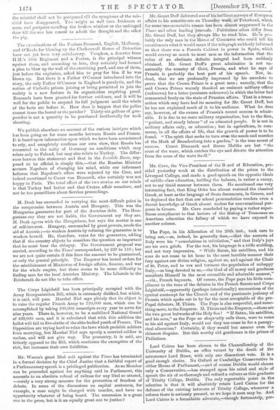Mr. Grant Duff delivered one of his brilliant surveys of
European affairs to his constituents on Thursday week, at Peterhead, which for some unaccountable reason has been almost suppressed in the Times and other leading journals. Politicians often differ from Mr. Grant Duff, but they always like to read hint. Heis pro- bably the only man in the llonie of Commons who could tell his constituents what it would mean if the telegraph suddenly informed us that there was a Pezuela Cabinet in power in Spain, which would convey as much to most men as the information that the value of an obstinate definite integral had been suddenly obtained. Mr. Grant Duff's great admiration is not un- naturally the country of Geist, Prussia, and what he says of Prussia is probably the best part of his speech. Not, in- deed, that we are profoundly impressed by his anecdote to prove that the Crown Prince is a great man ; namely, that the said Crown Prince warmly thanked an eminent military officer (unknown) for a letter (contents unknown) in which the latter had commented freely on the state of Prussian affairs. That is a trans- action which may have had its meaning for Mr. Grant Duff, but he has not explained much of it to his audience. What he does say, however, of the causes of Prussia's recent success is admir- able. It is due to no mere military organization, but to the firm, "patient, and steady labour" of an educated people. It is not in military affairs only, or education ; but in agriculture, in com- merce, in all the affairs of life, that the growth of power is to be found. "The spirit that seeks to turn eyed' the sands and marshes of the Mark of Brandenburg into a garden," is the true secret of success. Count Bismarck and Baron Moltke are but "the crest of the wave, which catches the eye and diverts the attention from the mass of the wave itself."






























 Previous page
Previous page